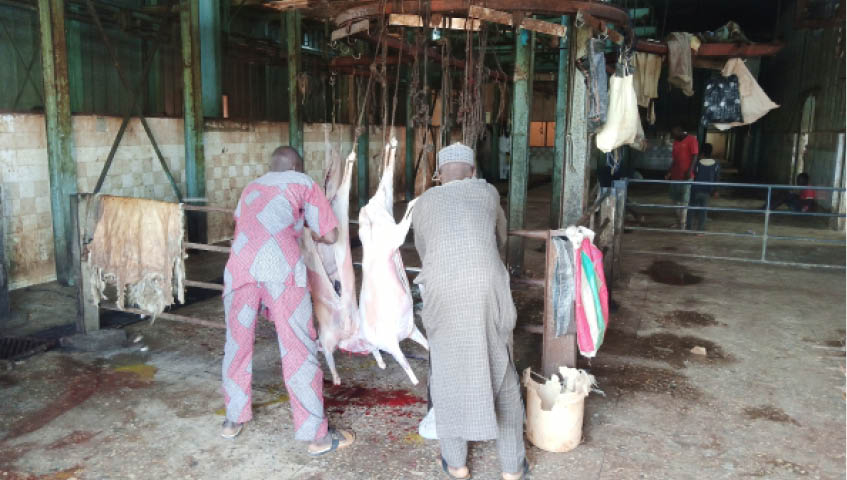The decision by the Katsina State government to concentrate all abattoirs in the capital has created discord between it and butchers in the state as Daily Trust reports.
Recently, the Katsina State government decided to bring the activities of all butchers in Katsina metropolis into the modern abattoir, thereby centralizing slaughter and sale of meat in the capital.
The relocation also means banning the business in five old abattoirs spread across the city.
Task force arrests 10 butchers, seize 2 cattle in clampdown on illegal abattoirs
Tension in Zuba as butchers, Koro natives clash
This development did not go down well with the butchers association, who considered the government’s decision as ill-timed, especially coming at a time when they are struggling to resuscitate their businesses from the COVID-19 pandemic.

However, defending the government’s decision, the Special Assistant (SA) to Governor Aminu Bello Masari on Livestock and Grazing Reserves, Dr Lawal Usman Bagiwa stated five reasons why the move was necessary.
He argued that the old abattoirs were built away from the city back then but population growth and the city’s expansion have caught up with them.
“All the old abattoirs are now surrounded by residential areas and they are so close to the environment such that it leads to spread of so many diseases,” he said.
Dr Bagiwa also pointed at the sanitary condition of the old abattoirs where there is no water supply to properly wash the meat.
Coupled with the population growth, Dr Bagiwa said the old abattoirs could no longer cater to the population.
“In those days, they slaughter a few animals for the population.
“The number has since multiplied, which also brings the issue of space even to keep the meat,” he said.
He also raised concerns about slaughtering animals at midnight without the supervision of health authorities.
And by the Meat Edict of the federal government, all animals slaughtered must be inspected either pre or post mortem to confirm if they are healthy for consumption.
Aside from this, Dr Bagiwa alleged that rustled cows are being slaughtered and sold at the abattoir.

“Some of the animals were poisoned either as a result of snakebite or something else, but they don’t give a damn, they slaughter them and sell to unsuspecting consumers, and by law, you cannot bring slaughtered animal into the abattoir,” he said.
Based on these considerations, he said, the government decided to set up a committee and a meeting was held with butchers’ representatives to discuss the changes and the move to the new abattoir with a capacity of slaughtering up to 200 cattle and up to 300 small ruminant animals a day.
However, the butchers have a problem with the plan, according to Sarkin Fawar Katsina, Alhaji Usman Saidu Tudun Yan’Shanu, the overall leader.
“We fully understood that government had a good reason for whatever decision it took that will affect the lives of its citizens, but the major problem is the timing of the movement,” he told Daily Trust.
“It is not as if we are just trying to go against the decision of the government, but rather my people are complaining about the timing.
“We are actually in a situation whereby a lot of us struggle to recover from the major setback that we suffered because of the COVID-19 pandemic.
“This government decision at this particular point in time is tantamount to forcing many of us out of business if the government insisted that all of us must be at one place at the same time.
“It is our business and we know its intricacies better than anyone,” he said.
He also argued that one of the reasons the government is advancing about the old abattoirs being surrounded by residential buildings could not hold water as the central abattoir itself could not pass that test if it were to be subjected to it.
Reacting to the allegation that rustled or stolen animals were being smuggled into the old abattoirs, the Sarkin Fawa, said, “Even if such things as alleged are taking place, it is not bringing us together under one roof that could solve the problem.
“The only solution lies in enlightenment and seeking the support and cooperation of all of us.”
The economic impact of the decision has caused some butchers to desert the slaughterhouses from the day the decision came into effect, he said.
Older and younger butchers could not move to the new abattoir as they simply couldn’t cope with the stress involved.
He called on the government to reconsider its decision and allow them to continue the way they were while adequate arrangements are put in place for the relocation at a more convenient time.
“We have been supportive of this administration as an association and we will continue to be.
“We know this administration listens to the calls, yearnings and aspirations of its people.
“I am therefore appealing to the governor to consider our situation and revert this decision until when we can converge considerably easily,” he prayed.

When Daily Trust visited one of the banned abattoirs at Gobarau, it was observed that though surrounded by residential buildings, the abattoir was clean and had running water.
The SA alleged that the cleanliness was an afterthought from the butchers following the ban.
A visit to the central abattoir revealed that while the slaughterhouse is modern, there is still certain areas that needed to be put in proper shape.
Some butchers our reporter met at the modern abattoir raised concerns that they found the place no better than where they left as there was no adequate water supply and poor lighting.
They also raised concerns about inadequate manpower to take care of the place taking into consideration the number of users of the facility at the moment.
“I have not seen anything in terms of sanitation that is better than our old places,” Alhaji Aliyu Musulmi, one of those who moved from the old abattoir said.
Another butcher, Alhaji Lawal Rabiu said due to shortage of water supply, they had to convey their meat back to the old abattoir for cleaning.
Our reporter observed that some of the butchers were still skinning their animals on the bare ground outside the main building, claiming that there was no better place for them to do it, while even those skinning inside were mostly doing it on the bare floor, as the hangers were not functional especially at the larger animals’ section.
Reacting to some of the concerns raised by the butchers, the Manager of the abattoir, Dr Shehu Ukashatu said operations at the abattoir are running smoothly despite some technical issues which are being addressed.
“In terms of water supply, we have a solar-powered borehole and we have a water reservoir, we also have two standby generators, one of which is a Mikano.
“Our cold rooms are currently under repairs and a contract has been awarded for the repair of the hangers at the larger animals section.
“Once these are done, we have no major issue,” he said.
Regarding the butchers, he said, “Actually, they have grudges against the centralization and they have grudges against our inspection.
“And public health is our major concern here and we will continue to ensure that Katsina people get the healthy meat they deserve,” he said.

 Join Daily Trust WhatsApp Community For Quick Access To News and Happenings Around You.
Join Daily Trust WhatsApp Community For Quick Access To News and Happenings Around You.


